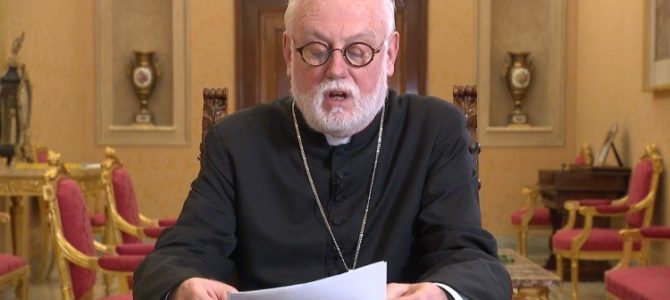Photo: Archbishop Paul Richard Gallagher, courtesy Vatican.
Great strides forward have been in recent decades in Jewish-Catholic relations, with better recognition on both sides allowing for more mutual understanding at the theological but also the social and political levels, Holy See secretary for relations with states Paul Richard Gallher said as part of a campaign by the Israeli embassy to the Vatican called #StopAntiSemitism.
Archbishop Gallagher in a video message posted last Thursday reiterated the Holy See’s commitment against intolerance towards people of Jewish heritage. He said the “Nostra Aetate” [In Our Age] declaration defining relations between the Church and non-Christian religions adopted by the Vatican II Council 55 years ago has helped broaden dialogue between Jews and Christians.
Archbishop Gallagher highlighted two points in Nostra Aetate: its emphasis on the Jewish roots of the Christian faith and the condemnation of anti-Semitism in every form and species.
“In this regard, much progress has been made in recent years,” the archbishop affirmed. “Mutual knowledge has led to a better understanding on theological, social and political levels, including bilateral Agreements by which diplomatic relations between the Holy See and the State of Israel have been established,” the Vatican reported on its official news website.
“He noted in speaking of the spiritual patrimony common to both Christians and Jews, the Council recommended “mutual knowledge and esteem” between them, which is achievable above all by “biblical and theological studies, as well as fraternal dialogues,” the Vatican reported.
Jewish Roots of the Christian Faith
The archbishop further stressed for the dialogue to be fruitful, it must be both “open and respectful,” because mutual respect “is a condition, and at the same time, the goal of dialogue,” to respect the right of others to life, to physical integrity, to fundamental freedoms, that is, freedom of conscience, of thought, of expression and of religion.
This, he explained, allows us to build together a climate of peace and fraternity, as the Pope encouraged in his recent encyclical “Fratelli Tutti” [All Brothers].
Church’s Condemnation of Anti-Semitism
On the second important point in Nostra Aetate, archbishop Gallagher echoed the declaration’s condemnation of anti-Semitism in all its forms and species “at any time and by everyone.” He stressed the Church cannot tolerate anti-Semitic acts because of the heritage she shares with Jews and because evangelical charity prevents her from doing so.
On this matter, he recalled correspondence between the Council of Ashkenazi Rabbis of Jerusalem and the Holy See which he described as a “small pearl” from the historical archives of the Section for Relations with States of the Secretariat of State.
Archbishop Gallagher explained that following targeted acts of intolerance against Jewish communities in 1919, the Ashkenazi Rabbinical Council turned to then-Pope Benedict XV, presenting him the situation and asking for his support to put an end to the persecution. He noted that in the reply to the rabbis’ request sent by the Secretariat of State, the Church said she was “opposed to acts of hatred against other brothers.”
He further noted that there are other examples of the Church at work against anti-Semitism, especially during WWII when diplomats of the Holy See worked to save the lives of some of our Jewish brothers and sisters.
“Differences of religion cannot allow anyone to do violence against the other,” archbishop Gallagher said. “And if this is a true principle towards everyone, it is equally true towards the Jews. In fact, this violence is against law and justice.”
In conclusion archbishop Gallagher thanked God for the true transformation that has taken place in relations between Jews and Catholics and echoed Pope Francis’s words back on the 50th anniversary of the declaration: “Indifference and opposition have changed into cooperation and benevolence. From enemies and strangers, we have become friends and brothers.”
Full text here.


